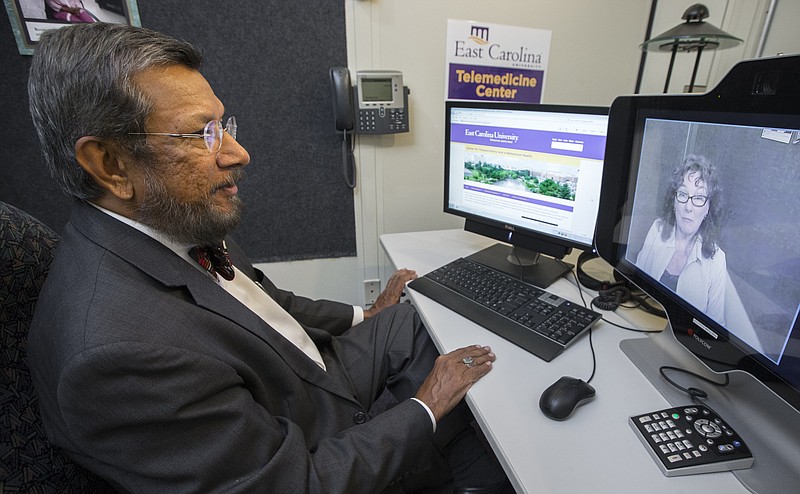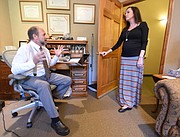Fast facts
› The total number of physicians in the U.S. increased by 45 percent from 1995 to 2013.› The number of adult and child psychiatrists rose by only 12 percent, from 43,640 to 49,079.› During that span, the U.S. population increased by about 37 percent.Source: American Medical Association
The number of psychiatrists in Chattanooga and across the U.S. is shrinking, forcing many to cut back on extensive client counseling and rely more and more on drugs, often administered by nonpsychiatrists, experts say. And that is worrying some in the field.
State medical officials say the situation will only get worse, reshaping the way psychiatrists interact with patients.
"Drugs have become safer and easier to use and more effective," said Dr. Lee Solomon, who has practiced psychiatry in Chattanooga for more than 30 years. "But all of the studies show that the best treatment is a combination of therapy and medication."
"There are people suffering from acute psychiatric problems who require help, people who are suffering from a chronic need for psychiatric evaluation who are not getting evaluated," said Dr. Nathaniel Clark, medical director at Vanderbilt Psychiatric Hospital. He cited veterans, those who live in rural areas and the homeless as three groups in particular that are not being adequately treated.
Federal health officials believe the U.S. needs one psychiatrist for every 30,000 people. Using that standard, Chattanooga has less than 45 percent of the psychiatrists it needs. And demand is increasing as the Affordable Care Act gives more Americans access to medical care.
The reasons for the shortage are both national and local. In general, psychiatrists don't make as much money as other doctors, and they don't always win the public's respect.
"There's still a bit of a stigma about having mental illness, about having to go see a psychiatrist," said Dr. Renate Rosenthal, a clinical psychologist who is director of medical student education in psychiatry at the University of Tennessee Health Sciences Center in Memphis. "They're seen as not really a doctor, particularly in our Southern region as opposed to the East Coast and West Coast."
As fewer medical school graduates have chosen psychiatry as a profession, the average age of those in practice has risen.
"[The average age of] psychiatrists [is] the oldest of all of the specialties, so there will be a lot of psychiatrists retiring and that will exacerbate the shortage," said Solomon, a psychiatrist at Behavioral Associates, one of the largest psychiatric practices in town.
To deal with the shortage, psychiatrists are increasingly spending less time talking to their patients and more time prescribing pills. That worries Rosenthal.
"Unfortunately, if you look at television and the advertisements for anti-depressants and sleep aids, we see people needing a pill for every ill, and that's not a healthy development," she said. "Why bother to come for a session and try to look at your life and see what you can do to help yourself when you can take a pill? Usually medication alone is not what makes a positive change in a patient's life."
Vanderbilt's Clark agreed.
"While mental illness is influenced by a patient's biological background, it is also affected by their social situation," he said. "You have to treat the whole person."
A better approach, both Rosenthal and Clark said, is for psychiatrists to make themselves more efficient by working with other doctors and delegating some of their work to other medical staffers who need less training, such as nurse practitioners. After completing an undergraduate degree, psychiatrists need at least seven years of training. They must graduate from medical school and then spend another four years as residents. A nurse practitioner, on the other hand, needs a nursing degree, which they can get as part of an undergraduate degree, and then two to three years in a masters degree program. Solomon said he has hired two nurse practitioners in the last two years.
"They act just like I do, they see patients and evaluate them, and my job is to supervise them and make sure their care is good," he said.
But adding nurse practitioners is not a complete solution.
"We've been adding nurse practitioners, and that has been very, very helpful, but adding more physicians is still a need," said Brennan Francois, head of Parkridge Hospital's Parkridge Valley campus for adults and children with psychiatric problems.
Psychiatrists are also working more with their colleagues.
"Sometimes the psychiatrist is a consultant and helps physicians with patients who are medically ill who also need psychiatric care," Rosenthal said.
And technology is allowing psychiatrists to spend more of their limited time counseling patients. As the quality of video over the Internet has increased, more psychiatrists are seeing patients remotely instead of in their offices. But there is still debate over whether the quality of such care is as good as an in-office visit.
Rosenthal said she believes the initial interview should be done in person.
"But for a followup, where the patient has been stabilized and is doing better, there is no need to travel for hours to see a psychiatrist for a few minutes just to be told you are doing better."
Solomon is willing to forgo the initial in-person visit.
"The studies that have been done have shown that when a patient first starts, there is some resistance [to video counseling], but over time we find they get a good relationship with the doctor," he said.
Medical educators still hope to boost the numbers of psychiatrists by convincing more medical students that psychiatry is a desirable specialty, particularly with its opportunity for patient interaction and the quality of life it affords.
"It's not a black-and-white business," Francois said. "You can't just go in and make a diagnosis - you need to spend time with people to figure out what to do."
"You have a unique ability to develop a healing relationship with your patients," Vanderbilt's Clark said.
Rosenthal had more practical reasons.
"While a psychiatrist's income is not that great the practice has very low overhead," she said. "You need an office, a polite secretary or receptionist, and a pleasant environment where the patient feels comfortable and calm - that doesn't cost very much."
Dr. Solomon agreed.
"The burnout rate for psychiatrists is second from the bottom," he said. "And the most expensive reusable equipment we have is Kleenex."
Contact staff writer Steve Johnson at sjohnson@timesfreepress.com or 423-757-6673.

